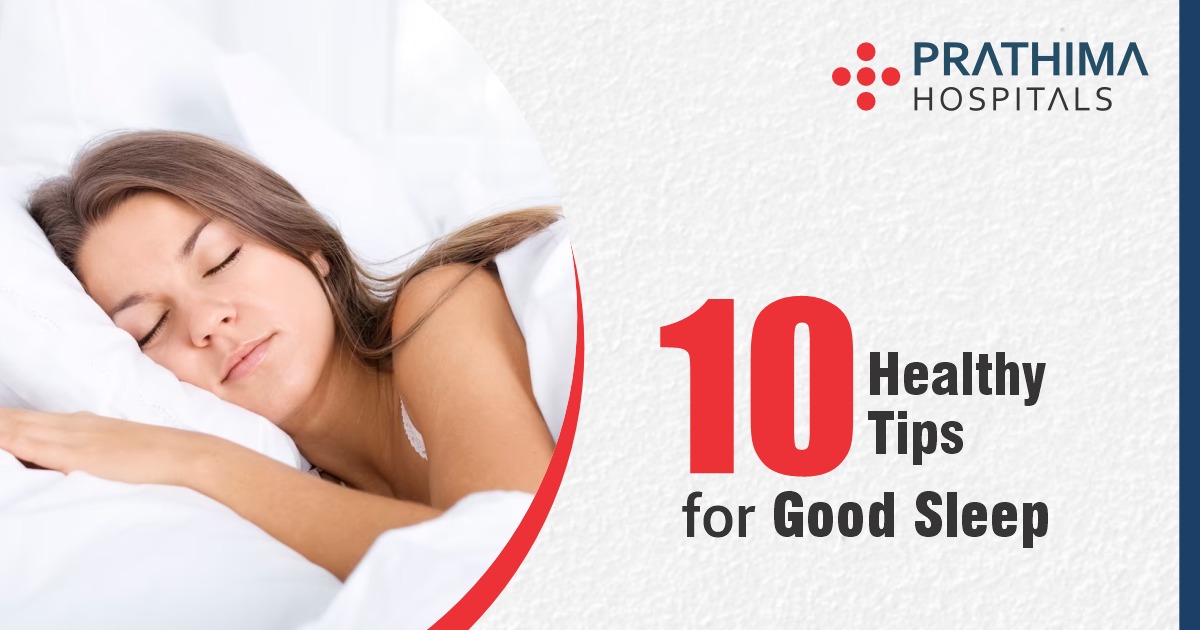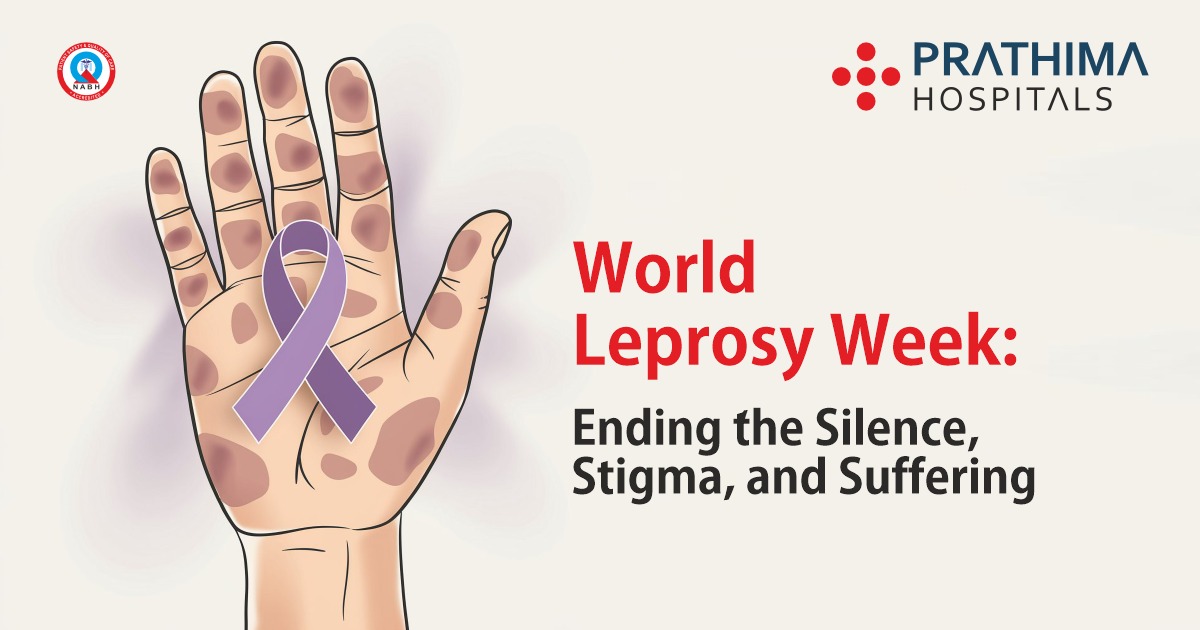How to Sleep Better at Night

10 Tips for Good Sleep
Introduction:
The quality of our sleep is vital to our overall health and well-being, as well as the efficiency of our daily activities. However, many individuals struggle with sleep-related issues, leading to fatigue, mood swings, and reduced productivity. Fortunately, there are several effective strategies to promote a restful night’s sleep as said by the Best Pulmonologist in Hyderabad, Prathima Hospitals. In this article, we will explore the science behind sleep, common factors that disrupt sleep patterns, and practical tips and techniques to improve sleep quality. By implementing these strategies, you can unlock the secrets to achieving a rejuvenating and refreshing sleep each night.
Understanding the Science of Sleep:
Sleep is a complex biological process vital for various bodily functions. It consists of two main stages: Rapid Eye Movement (REM) sleep and Non-Rapid Eye Movement (NREM) sleep. During REM sleep, the brain is highly active, and vivid dreams occur, while NREM sleep is characterized by deep relaxation and physical restoration.
Disruptors of Sleep:
Several factors can disrupt our sleep patterns and negatively impact sleep quality. Here are detailed explanations of common disruptors of sleep:
1. Stress and Anxiety:
Stressful life events, work pressures, or personal worries can lead to racing thoughts, making it difficult to relax and fall asleep. Anxiety can also contribute to insomnia and restless sleep. As said by the Best Pulmonologist in Kukatpally, it’s important to address stress and anxiety through stress-management techniques, such as meditation, deep breathing exercises, or seeking support from a therapist or counsellor.
2.Poor Sleep Hygiene:
Inconsistent sleep schedules, irregular bedtimes, and waking up at different times can disrupt your body’s internal clock and make it challenging to fall asleep. Additionally, excessive daytime napping or spending too much time in bed when awake can affect sleep quality. Establishing a consistent sleep routine and sticking to it can help regulate your sleep-wake cycle.
3. Electronic Devices and Blue Light Exposure:
The blue light emitted by electronic devices like smartphones, tablets, and televisions can interfere with the production of melatonin, a hormone that regulates sleep. Using these devices before bed can suppress melatonin levels and disrupt the natural sleep-wake cycle. Limiting screen time, especially close to bedtime, and utilizing blue light filters or “night mode” settings can help mitigate this disruption.
4. Environmental Factors:
Sounds, lights, and also temperature can greatly affect sleep grade. Loud noises from traffic, neighbours, or snoring partners can disturb sleep and cause awakenings throughout the night. Excessive light in the bedroom, including streetlights or electronic devices, can interfere with melatonin production. Uncomfortable room temperatures, either too hot or too cold, can also disrupt sleep. Creating a quiet, dark, and cool sleep environment by using earplugs, blackout curtains, and eye masks, and adjusting the thermostat can improve sleep quality.
5. Uncomfortable Sleep Surfaces:
An uncomfortable mattress, pillows, or bedding can lead to physical discomfort and restless sleep. A mattress that is too firm or too soft may cause pressure points or improper spinal alignment, while worn-out pillows may not provide adequate support for the head and neck as said by the Best Pulmonologist in Kachiguda. Investing in a supportive mattress and pillows that suit your preferences can significantly improve sleep comfort.
6. Caffeine and Stimulant Consumption:
Consuming caffeine, nicotine, and other stimulants close to bedtime can interfere with sleep initiation and quality. Caffeine, found in coffee, tea, soda, and chocolate, is a stimulant that can keep you awake and alert. It is advisable to limit or avoid these substances, especially in the late afternoon and evening, to minimize their disruptive effects on sleep.
7. Medical Conditions and Medications:
Various medical conditions, such as sleep apnea, chronic pain, allergies, or gastrointestinal issues, can disrupt sleep patterns. Certain medications, including those for allergies, asthma, pain, and psychiatric disorders, may also have sleep-disturbing side effects. It is important to consult with a healthcare professional if you suspect an underlying medical condition or if your medications are impacting your sleep.
8. Restless Leg Syndrome (RLS) and Periodic Limb Movement Disorder (PLMD):
RLS is a neurological disorder characterized by uncomfortable sensations in the legs, often leading to an irresistible urge to move them. PLMD involves involuntary movements of the legs during sleep. Both conditions can cause frequent awakenings and disrupt the sleep cycle. Medical evaluation and treatment options are available for managing RLS and PLMD.
9.Hormonal Changes:
Hormonal fluctuations, such as those experienced during pregnancy, menopause, or menstrual cycles, can disrupt sleep. Symptoms like hot flashes, night sweats, or mood changes can interfere with falling asleep or staying asleep. Managing these hormonal changes with lifestyle adjustments, relaxation techniques, and medical interventions can help improve sleep quality.
10. Mental Health Disorders:
Stress disorders, sadness, & post traumatic stress disorder {PTSD} all impact sleep rate. Addressing and treating the underlying mental health conditions through therapy, medication, or other appropriate interventions can help alleviate sleep disturbances.
Tips for Promoting Restful Sleep:
Promoting restful sleep is crucial for maintaining overall well-being and optimizing daily productivity. Here are detailed tips to help you achieve a restful night’s sleep:
1. Make a Consistent Sleep Schedule:
Even on weekends, try to wake up and go to bed at the same time every day. Your body’s internal clock will be regulated with consistency, making falling asleep and waking up easier. Determine the number of hours of sleep you need and plan your bedtime accordingly.
2. Create a Soothing Sleep Environment:
Optimize your bedroom to promote a relaxing sleep environment. Use blackout curtains or eye masks to keep the room dark. Invest in a white noise machine or earplugs to reduce noise. Maintain a comfortable temperature between 60 and 67 degrees Fahrenheit (15-19 degrees Celsius) for optimal sleep conditions. Bedding, pillows, and mattresses that support your body will contribute to your comfort.
3. Practice Relaxation Techniques:
Engage in relaxation practices before bed to calm your mind and signal your body that it’s time to unwind. Deep breathing exercises, such as diaphragmatic breathing or the 4-7-8 technique, can induce relaxation. Meditation or mindfulness practices can help relieve stress and tension. Gentle stretching or yoga can release tension from the body.
4. Limit Exposure to Electronics:
The blue light emitted by electronic devices like smartphones, tablets, and televisions can suppress melatonin production, making it harder to fall asleep. Avoid using gadgets for at least an hour before going to sleep. If necessary, use blue light filters or enable the “night mode” feature on your devices to reduce the impact of blue light.
5. Create a Bedtime Routine:
Designate a pre-sleep practice to signal to your body that it’s moment to wind down. Make sure your mind and body are prepared for sleep by engaging in activities that promote relaxation. Reading a book, taking a warm bath or shower, practising gentle stretches, or listening to calming music can be effective components of a bedtime routine.
6. Optimize Your Sleep Environment:
Evaluate your sleep environment for any factors that may disrupt your sleep. Noise-cancelling earplugs or a white noise machine can help you block out external noises. By wearing an eye mask, you will be able to block out light. If necessary, invest in a comfortable mattress, pillows, or bedding that suits your preferences.
7. Exercise Regularly:
Exercise can improve sleep quality when done regularly. Strive to engage in moderate-intensity physical activity for at least 30 minutes on most days of the week. According to the Best Pulmonologist in KPHB, it’s advisable to avoid vigorous exercise too close to bedtime, as it can activate your body and potentially hinder your ability to easily fall asleep. Morning or afternoon exercise is generally more beneficial for sleep.
8. Watch Your Diet and Avoid Stimulants:
Be mindful of your diet, particularly in the evening. Avoid heavy, greasy meals close to bedtime, as they can cause discomfort and disrupt sleep. Limit caffeine intake, especially in the afternoon and evening, as it can interfere with falling asleep. Opt for sleep-friendly snacks if you need something before bed, such as a small portion of fruit, yoghurt, or herbal tea.
9. Manage Stress and Anxiety:
High stress and anxiety levels can significantly impact sleep quality. Develop stress-management techniques that work for you, such as journaling, deep breathing exercises, or talking to a trusted confidant. Prioritize relaxation and self-care throughout the day, incorporating activities that help you unwind and reduce stress.
10. Consult a Healthcare Professional:
If you consistently struggle with sleep issues despite implementing various strategies, it is advisable to seek professional help. A healthcare professional, such as a sleep specialist or therapist, can provide personalized guidance, identify underlying medical or psychological causes, and suggest appropriate treatments or therapies.
Conclusion:
Acquiring a relaxing night’s sleep is within your grip. By understanding the science of sleep, identifying potential disruptors, and implementing effective strategies, you can transform your sleep habits and improve your overall well-being. Try out various methods and explore which techniques suit you best through experimentation. Remember, consistent practice and patience are key when establishing healthy sleep patterns. Embrace the power of quality sleep, and wake up each morning feeling refreshed, energized, and ready to take on the day ahead.
.
.
.
.
.
For more details:
📞:: 733 733 6600 | 040 4345 4345
🌐:: https://prathimahospitals.com/book-appointment/






Warning: Undefined variable $req in /home/u885608126/domains/prathimahospitals.com/public_html/wp-content/themes/prathimahospitals/functions.php on line 294
Warning: Undefined variable $commenter in /home/u885608126/domains/prathimahospitals.com/public_html/wp-content/themes/prathimahospitals/functions.php on line 295
Warning: Trying to access array offset on value of type null in /home/u885608126/domains/prathimahospitals.com/public_html/wp-content/themes/prathimahospitals/functions.php on line 295
Warning: Undefined variable $aria_req in /home/u885608126/domains/prathimahospitals.com/public_html/wp-content/themes/prathimahospitals/functions.php on line 295
Warning: Undefined variable $req in /home/u885608126/domains/prathimahospitals.com/public_html/wp-content/themes/prathimahospitals/functions.php on line 298
Warning: Undefined variable $commenter in /home/u885608126/domains/prathimahospitals.com/public_html/wp-content/themes/prathimahospitals/functions.php on line 299
Warning: Trying to access array offset on value of type null in /home/u885608126/domains/prathimahospitals.com/public_html/wp-content/themes/prathimahospitals/functions.php on line 299
Warning: Undefined variable $aria_req in /home/u885608126/domains/prathimahospitals.com/public_html/wp-content/themes/prathimahospitals/functions.php on line 300
Warning: Undefined variable $commenter in /home/u885608126/domains/prathimahospitals.com/public_html/wp-content/themes/prathimahospitals/functions.php on line 303
Warning: Trying to access array offset on value of type null in /home/u885608126/domains/prathimahospitals.com/public_html/wp-content/themes/prathimahospitals/functions.php on line 303